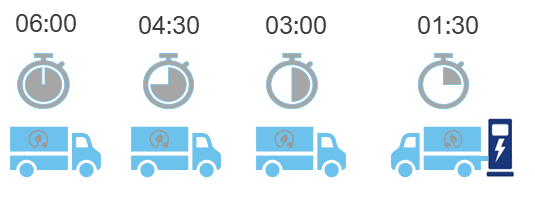The electrification of medium-duty transport fleets or let’s say Delivery Vans is growing fast! Driving range, efficiency and costs of these EVs are ideal for retailers. Amazon recently ordered 100,000 from Rivian and Walmart 4,500 from Canoo but how does it work for any company to start electrifying their fleet?
How is it to own and run a fleet of electric delivery vehicles?
This episode of the SNGLR Group podcast with smart mobility experts discusses the benefits and challenges of medium-duty transport fleets electrifications:
– How is it to own and run a fleet of electric delivery vehicles?
– What do you need to charge these EVs?
– How secure are these charging infrastructures?
What are the EV Charging challenges of electric delivery vans?
Medium-duty transport vehicles have batteries that go from 100kWh to 300kWh. Charging these vehicles is not a matter of 2-5 minutes but rather 30 minutes to 6-7 hours depending on the type of vehicle, type of chargers and the available capacity.
Capacity: How much do you need?
All suddenly your parking becomes a gas station! How much infrastructure and energy do you need to supply to charge your fleet? Do you have sufficient capacity to provide 100 to 200 kWh per EV, do you need to get them charged at any time? Professional EV charging service providers can measure and discuss your EV charging pattern to define the needed capacity.
Scheduling: When and how much energy?
This is the planning part of the charging. How do you organize the fleets to get them constantly ready to be on the road and deliver? This requires some organizations to get the right vehicle with enough battery to go ahead. Reaching 80% is fast, getting to the last 20% can take double the time but do you need to? An efficient charging scheduling can be achieved with a Smart load management system with scheduling capabilities such as the Saascharge EV charging platform.
Travelling: Where can I charge and how?
How can you travel further away than the necessary range of the battery? Can we just charge anywhere? Good news, it’s electricity! Now some networks exist, for example, fast networks such as Electrify America in US and IONITY in Europe. Also, the capacity to charge at the customers’ site while you are unloading is a possibility.
How to plan your EV charging needs for your electric vehicle fleet?
1. Plan the first installation
This is the most challenging as you have no data and requires an engineering company to realise these actions:
- Understand usage profile: Some analysis about the mileage of your vehicles and planning. When and how much charging is needed?
- Charging infrastructure sizing: Depending on the analysis you may need fast chargers to get your fleet back on the road immediately or night charging with Level 2 chargers could be sufficient for your daily use.
- Site survey planning: This is the ground analysis to define the necessary capacity requirements for the cabling and prepare the necessary permit to get your installation running.
2. Install charging station
These can be performed by the same company that does the design or not.
- Project management to coordinate all different jobs and permit requirements
- Construction work with tranching and cabling
- Charging station installation
3. Operate your EV charging network
These are the system and organizations needs to manage your charging operations
A. Operation task to manage your chargers: Monitoring the availability with remote diagnostic capabilities.
B. Manage your fleets when charging on another network or accounting transactions to external fleets

4. Capacity management (Load management)
Capacity is precious and expensive, that’s the part of managing the electricity load with energy distribution and demand response. Usage understanding is key and can be operated with the right team and an efficient EV charging platform such as Saascharge to gain efficiency, and freedom and move on a step-by-step basis to electrify the whole fleet.

Credit
Jim Castelaz, CTO & Founder of Motiv Power Systems
Prasad Ramakrishnan, COO at Motiv Power Systems & mobility Partner at SNGLR Group
Richard Albrecht CEO & Founder of Saascharge.
This podcast was produced by SNGLR Group with the moderation of Luca Sambucci
